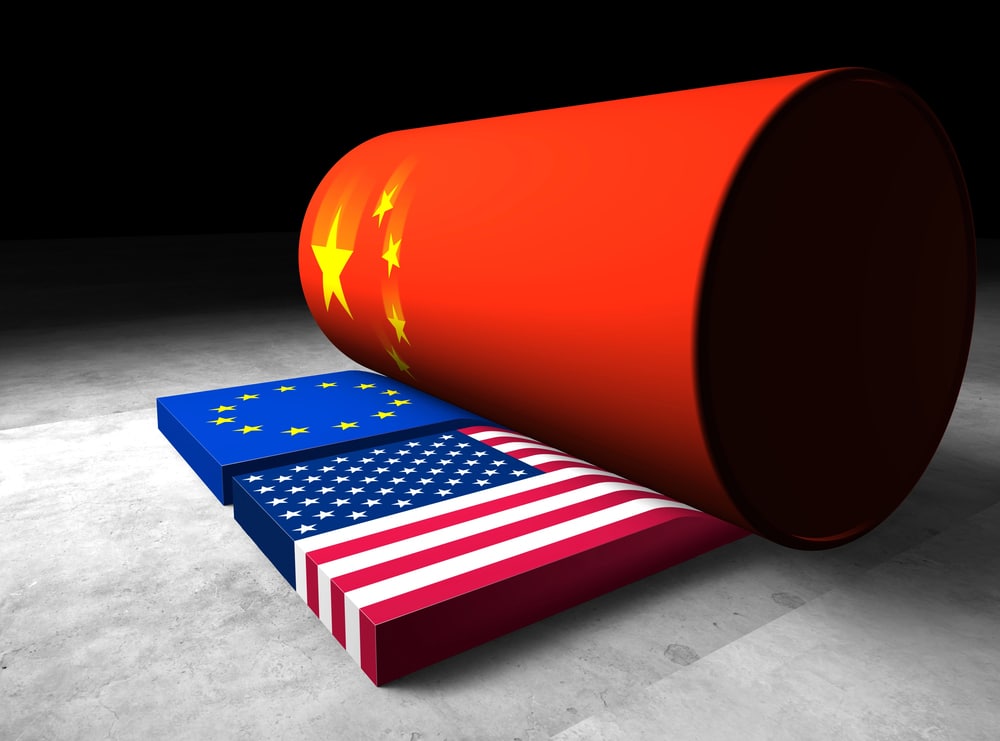The United States is working hard to create a global narrative of itself as the leader of a generational struggle to advance democracy, peace, and international law and push back the forces of autocracy, aggression, and erosion of the rule of law.
The facts look strangely different than the fiction. While the U.S. is energetically working to inhibit diplomacy and exploit conflict to advance its own economic and hegemonic interests, China, one of the arch villains of the American narrative, is pushing diplomacy.
The U.S. is blocking diplomacy in Ukraine, declining to push diplomacy in Gaza, and exploiting a security arrangement in the larger Middle East that preserves antagonism between the two great powers, Saudi Arabia and Iran. Meanwhile, China is brokering diplomacy in all three.
Since 2006, there has been a split between Hamas in Gaza and Fatah in the West Bank. Neither Palestinians nor peace talks have benefitted from that split, and past attempts to heal it have failed. But, on July 23, China brokered an agreement between Hamas and Fatah on a “national unity” government. The parties agreed to govern the Gaza strip together once the war with Israel is over. They further agreed to declare unity during the war and establish a unified leadership that would run in the next elections.
Whether or not the agreement bears fruit, China’s accomplishment is “a clear diplomatic win for Beijing” that “bolster[s] China’s claim to being a global mediator,” as The Washington Post put it. It continues the ascension of Chinese influence and diplomacy in a region that was, until very recently, the sole preserve of the United States. That ascension is aided by a growing change of perception in the Middle East. Stephen Zunes, Professor of politics at the University of San Francisco and an expert on the Middle East, emphasized the contrast to me between “the United States and Western European countries [who] have little credibility in the Middle East due to the history of colonialism, support for Israel, support for Arab dictatorships, and military intervention” and China that “doesn’t have such baggage.” China has been able to “take advantage of that,” Zunes told me, “as they have in Africa and Latin America, to advance their economic and diplomatic agenda.”
But Palestine is not the only place in the Middle East where the world has been shocked by unexpected Chinese diplomacy. In March 2023, China brokered a deal that, until it was announced, was thought to be unthinkable. While the U.S. was sidelined and left out of the room, China brokered the most transformative realignment in the Middle East in recent history. Regional rivals Saudi Arabia and Iran signed an agreement to resume diplomatic relations.
While Chinese foreign policy benefits from stability in the region, America’s Middle East policy exploits division and hostility. A core element of U.S. foreign policy in the region is the establishment and maintenance of a coalition against Iran. That coalition depends on a schism between Saudi Arabia and Iran. The Chinese brokered agreement heals that schism and dissolves the coalition. While the U.S. tried to ossify rivalry and hostility, China brought diplomacy.
While American foreign policy in the Middle East has exploited coalitions, Chinese foreign policy rejects blocs and alliances. Chas Freeman, former ambassador to Saudi Arabia and a China specialist, explains that, “Politically, unlike the United States (which has cooperative relations with some West Asian nations and antagonistic relations with others) China has pursued a policy of friendship and economic intercourse with all.” He says that “China is an important interlocutor, not a patron or ally of any West Asian state. It does not threaten any nation in the region, but it has carefully avoided assuming any commitment to defend one.”
Unlike the United States, that friendship to all but alliance with none has promoted China to the level of honest broker. An important part of recent U.S. foreign policy in the Middle East has been to block that Chinese promotion. But Freeman says that the U.S. has offered only “military carrots and sticks” and no real alternative to China. U.S. friendship comes with stern political and economic demands; China offers economic and diplomatic friendship with few demands for restructuring.
Freeman says that when China courts the Sunni countries of the Gulf Cooperation Council, the only U.S. counter to this invitation is to argue that their Iranian enemy is also America’s Iranian enemy. Since China is not an enemy of Iran, “this makes us a friend and military ally, where China is not.” The U.S. then demands that the Arab states sign up for the American “anti-Russian, anti-Chinese agenda.” Freeman calls this U.S. counter “residual imperial overreach masquerading as diplomacy.”
But even the military carrots have lost their effectiveness. When Saudi Arabia signed its Chinese brokered agreement with Iran, Annelle Sheline, Research Fellow in the Middle East program at the Quincy Institute, told me that “Saudi Arabia’s move to reducing tension with Iran reflects their new despair of the US either prioritizing Saudi preferences or being willing to act as a guarantor of Saudi Arabia’s security.” As reasons for the Saudi conclusion, Sheline says “From Obama’s signing of the JCPOA, to Trump’s lack of response after the September 2019 attacks on Saudi oil facilities, to Biden pulling out of Afghanistan, the past three US administrations have alarmed the Saudi rulers.”
Arab populations no longer feel secured or comforted by the United States. Instead, most Arabs have, for many years, seen the United States as their greatest threat. A 2024 poll of sixteen Arab countries found that 51% of people who responded say that the U.S. is the biggest threat to peace and stability in the region. While Freeman says that “[t]he best estimate is that, since the end of the Cold War, the United States has been directly or indirectly responsible for the death of 4 million Muslims, most of them Arabs,” he adds that “So far, in Arab eyes, China is free of such delinquencies.”
The healing between Saudi Arabia and Iran has been further accommodated by their coming together in the Chinese and Russian led BRICS, which they together jointed in 2023.
China’s diplomatic ascension has not been contained to the Middle East. While the U.S. assertively blocks a diplomatic end to the war in Ukraine, China is attempting to facilitate one. In the first months of the war, Russia and Ukraine came very close to negotiating a diplomatic end to the war. Instead of supporting that diplomacy, the United States blocked it.
Once again, conflict served core American foreign policy objectives. Conflict in Ukraine enforced America’s open door NATO policy. Ukrainians are fighting less for their right to join NATO then for NATO’s right to let Ukraine join. “This war,” State Department spokesperson Ned Price explained early on “is in many ways bigger than Russia, it’s bigger than Ukraine…There are principles that are at stake here…core principles.” One of those core principles, it turns out, is “that each and every country has a sovereign right to determine its own foreign policy, has a sovereign right to determine for itself with whom it will choose to associate in terms of its alliances, its partnerships, and what orientation it wishes to direct its gaze.”
Diplomacy was on its way to ending the war on terms that satisfied Ukraine. But the war went on because it did not satisfy America’s. While China enjoys a no limits partnership with Russia and has not been entirely objective in the war, it has, on multiple occasions, attempted to advance diplomacy.
China has repeatedly declared its willingness to play “a constructive role” in negotiations. They have put forward a proposal on a political settlement of the war as well as a joint proposal for a political settlement with Brazil. China has recently claimed that the China-Brazil joint proposal has received “positive responses” from more than 110 countries.
And on July 24, China invited Ukraine’s Foreign Minister Dmytro Kuleba to China for the first time since the war began. Chinese Foreign Minister Wang Yi reiterated that “China believes that the resolution of all conflicts must ultimately start with a return to the negotiation table” and that Beijing is willing to continue playing a role in peace talks. After their meeting, Kuleba stated that Ukraine “is ready to engage the Russian side in the negotiation process at a certain stage when Russia is ready to negotiate in good faith,” though he added that Ukraine does not yet see any sign of that. Wang said that “Recently, both Russia and Ukraine have signaled their willingness to negotiate to varying degrees. Although the conditions and timing are not yet ripe, we support all efforts that contribute to peace.”
A public statement that Ukraine is ready to negotiate with Russia is a positive outcome of the meeting. And the Chinese tone that they would support that willingness is very different from the American tone that declined to support that willingness in the early days of the war.
And that has been the disturbing pattern that undermines the American narrative of the United States as the leading force for international order and global security and of China as a leading force for disorder. The recent record suggests instead that it is the U.S. that is impeding diplomacy and fueling conflict while China tamps down conflict and supports diplomacy.
































